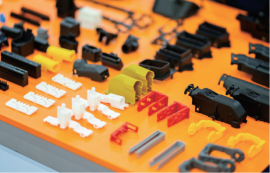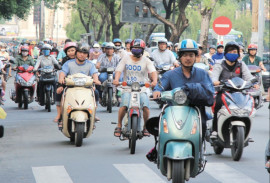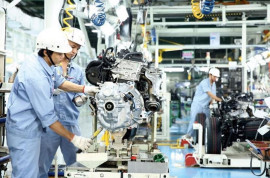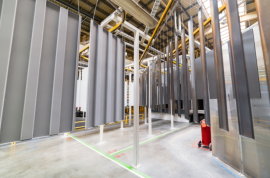The automobile industry is one industry that receives many incentives from the government to promote the industry's development.

One of the incentives is the automobile-supporting industry tax program that has been implemented by the Ministry of Finance since 2020. Accordingly, businesses are completely exempted from import taxes on raw materials, supplies, and components for production, and processing (assembly) of supporting industrial products. This policy will be extended until 2027 according to the provisions of Decree No. 101/2021/ND-CP dated November 15, 2021. Subjects of application are enterprises manufacturing, processing (assembling) automobile components and spare parts; Automobile enterprises produce and process (assemble) auto components and spare parts themselves. To enjoy the 0% import tax incentive for components, businesses must meet the requirements for minimum general output and minimum specific output for the committed vehicle model.
With this regulation, many famous car brands present in Vietnam such as Toyota, Honda, Mazda, Kia, Hyundai, and Mitsubishi... all meet the conditions for incentives. Industry-leading manufacturers and assemblers such as THACO, TC Motor, and Vinfast also save millions of dollars from the tax exemption policy, leading to many small and medium-sized enterprises and secondary businesses benefiting in the price chain.
In addition, to encourage the production and consumption of environmentally friendly products, the Law on Special Consumption Tax (SCT) in Vietnam stipulates that electric cars have a lower tax rate than other internal combustion engine cars with the same carrying capacity or number of seats.
In particular, the special consumption tax rate for internal combustion engine cars ranges from 15 - 150% depending on the vehicle model and cylinder capacity. For hybrid electric vehicles (HEV, PHEV), vehicles using bioenergy, in which the proportion of gasoline energy use is not more than 70%, a special sales tax rate equal to 70% of the tax rate applied to gasoline-powered vehicles is applied. For pure electric vehicles (BEV, FCEV) passenger vehicles with 9 seats or less, the special consumption tax rate is 15%, from 10 to less than 16 seats is 10%, from 16 to 24 seats is 5%, medium type carrying both people and goods is 10%.
On January 11, 2022, the 15th National Assembly continued to pass Law No. 03/2022/QH15 amending and supplementing several articles of the Law on Special Consumption Tax, including adjusting and reducing the special consumption tax rate for electric cars down to 1 - 3% (applied from March 1, 2022 - February 28, 2027) and 4 - 11% (applied from March 1, 2027).

On January 15, 2022, the Government issued Decree No. 10/2022/ND-CP regulating the registration fee rate of 0% for battery electric cars registered for the first time within 3 years from the date of registration starting from March 1, 2022. In the next 2 years, this fee will be 50% of the fee for gasoline and diesel cars with the same number of seats. For vehicles registered for the second time onwards, the registration fee payable is uniformly 2% nationwide, applicable to both electric vehicles and vehicles using internal combustion engines.
It can be seen that support policies for the electric vehicle industry in Vietnam have been initially developed and implemented, based on a system of existing regulations and policies for vehicles using internal combustion engines. With incentives on special sales tax and registration fees, domestic consumers will enjoy a large cost reduction when buying electric cars. For manufacturers, tax incentives encourage businesses to increase investment in the field of manufacturing and assembling battery electric cars. But compared to other countries in the region and the world, Vietnam's policies are considered to still be at a "modest" level.
Maybe at present, even though the automobile market in Vietnam is only at a "beginning" or "developing" level, it has not yet caught up with countries in the region such as Thailand, Indonesia, or Malaysia in terms of usage of environmentally friendly vehicles, but Vietnam's electric vehicle market has great potential. Prof. Dr. Dam Hoang Phuc, Director of the Automotive Technical Training Program - School of Mechanical Engineering - Hanoi University of Science and Technology commented: "The Vietnamese automobile industry is not dependent on internal combustion engines. We can invest heavily in electric vehicles with the mindset of "nothing to lose". This is the golden time for us to do that."
Authors: NC Network Vietnam Anh Tri, Hoang Giang / Special thanks to industrial expert Nguyen Thi Xuan Thuy




















